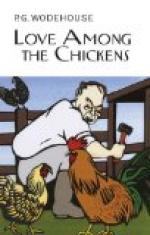Ukridge probably knew less about the Irish question than any male adult in the kingdom, but he had boomed forth some very positive opinions of his own on the subject before I could get near enough to him to whisper a warning. When I did, I suppose I must have whispered louder than I had intended, for the professor heard me, and my words acted as the match to the powder.
“He’s touchy about Ireland, is he?” he thundered. “Drop it, is it? And why? Why, sir? I’m one of the best tempered men that ever came from Dublin, let me tell you, and I will not stay here to be insulted by the insinuation that I cannot discuss Ireland as calmly as any one in this company or out of it. Touchy about Ireland, is it? Touchy—?”
“But, professor—”
“Take your hand off my arm, Mr. Garnet. I will not be treated like a child. I am as competent to discuss the affairs of Ireland without heat as any man, let me tell you.”
“Father—”
“And let me tell you, Mr. Ukridge, that I consider your opinions poisonous. Poisonous, sir. And you know nothing whatever about the subject, sir. Every word you say betrays your profound ignorance. I don’t wish to see you or to speak to you again. Understand that, sir. Our acquaintance began to-day, and it will cease to-day. Good-night to you, sir. Come, Phyllis, me dear. Mrs. Ukridge, good-night.”
CHAPTER IX
DIES IRAE
Why is it, I wonder, that stories of Retribution calling at the wrong address strike us as funny instead of pathetic? I myself had been amused by them many a time. In a book which I had read only a few days before our cold-dinner party a shop-woman, annoyed with an omnibus conductor, had thrown a superannuated orange at him. It had found its billet not on him but on a perfectly inoffensive spectator. The missile, said the writer, " ’it a young copper full in the hyeball.” I had enjoyed this when I read it, but now that Fate had arranged a precisely similar situation, with myself in the role of the young copper, the fun of the thing appealed to me not at all.
It was Ukridge who was to blame for the professor’s regrettable explosion and departure, and he ought by all laws of justice to have suffered for it. As it was, I was the only person materially affected. It did not matter to Ukridge. He did not care twopence one way or the other. If the professor were friendly, he was willing to talk to him by the hour on any subject, pleasant or unpleasant. If, on the other hand, he wished to have nothing more to do with us, it did not worry him. He was content to let him go. Ukridge was a self-sufficing person.
But to me it was a serious matter. More than serious. If I have done my work as historian with an adequate degree of skill, the reader should have gathered by this time the state of my feelings.
“I did not love as others do:
None ever did that I’ve
heard tell of.
My passion was a by-word through
The town she was, of
course, the belle of.”




